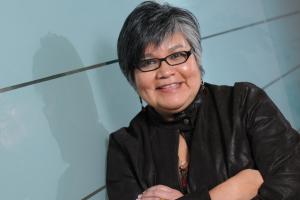
Isabel Jackson is a member of the Gitxsan First Nation. She grew up in coastal British Columbia, mainly in Prince Rupert. As a young student, Jackson developed an affinity for the sciences, and pursued this interest by enrolling in undergraduate studies in the Faculty of Science at the University of British Columbia (UBC).
Jackson left UBC before completing her undergraduate degree, taking a ten-year hiatus. When asked why she had taken a break in her studies, Jackson responds: “I had a difficult time when I first started out at university. I did not have any relatable role models. Aboriginal people typically did not even graduate from high school, let alone attend or graduate from university.”
During the time that Jackson was out of school, she worked in an office environment and focused on growing her family. By the time Jackson decided to return to UBC, she and her husband Jim (Tait) had two daughters, Cori and Carmen.
Feeling that she had more to offer, Jackson decided to pick up where she left off and complete her science degree. Various people, including her husband, suggested that Jackson should pursue a career in law. This was the push Jackson needed to begin making inquiries at the UBC Faculty of Law. She recalls the time she phoned the law school and first spoke with the director of the First Nations program.
“The director of the First Nations program at the time was John Borrows. If he had not been as open and encouraging as he was, perhaps I would have never applied [to law school]. As it happened, I did apply, and the rest as they say is history.”
Though she initially found it daunting, Jackson greatly enjoyed law school, especially the opportunity it gave to meet some great people. Jackson highlights the camaraderie of the law school community, noting that she received a lot of mentorship and support, even from younger students. In particular, Jackson credits John Borrows and Kelly MacDonald, former directors of the UBC Law First Nations program, for their support.
In Jackson’s second year of law school, her son Christian was born. She remembers the law school administration going out of its way to accommodate her needs.
“Being a mother and a law student was challenging. I planned my schedule around my kids,” explains Jackson. “For example, I could not take classes that interfered with their drop off and pick up times at school. I preferred exams to papers, because they required less time to prepare.”
Jackson graduated in 1998, and articled in a small downtown firm in Vancouver. She recalls feeling incredibly blessed to have secured articles. The job-hunting process for Jackson consisted of one mass mail-out of resumes to articling firms. From this endeavor, she landed one interview, and secured her articling position.
After being called to the British Columbia Bar in 1999, Jackson moved in-house to work as an auditor with the Canada Revenue Agency (CRA). After one year at the CRA, Jackson was seconded to the Department of Justice (DOJ), where she has been for the past 15 years.
“Initially, I wanted to practice tax law at the DOJ,” says Jackson. “However, I eventually moved into the Aboriginal Law Litigation section. My practice now involves working on residential school claims, judicial review cases arising out of the Indian Act, Specific Claims Tribunal work, as well as rights and title cases.”
Significantly, Jackson is involved in numerous efforts to increase Aboriginal engagement with the legal profession. She is involved in departmental initiatives at the DOJ toward making it an employer of choice for Aboriginal people.
“The legal profession struggles with attracting Aboriginal people. It is a tough profession, and perhaps the old-world thinking that remains in the profession is why Aboriginal people do not always feel welcome.”
Jackson is also a co-founder of the Aboriginal Lawyers’ Forum (ALF) of the Canadian Bar Association of BC (CBA-BC). The ALF is a supportive social forum for law students, law graduates and lawyers, providing networking, professional development, leadership, and mentorship, for its members. The ALF is separate and apart from the Aboriginal Law Section of the CBA-BC, which is more focused on substantive legal education.
“The ALF has now been in existence for five years, and members really appreciate having it,” says Jackson. “We first proposed this forum to the CBA-BC to address issues related to attracting and retaining Aboriginal people in the legal profession, and the CBA-BC jumped on the idea. It is ultimately about getting together and developing critical mass to support one another.”